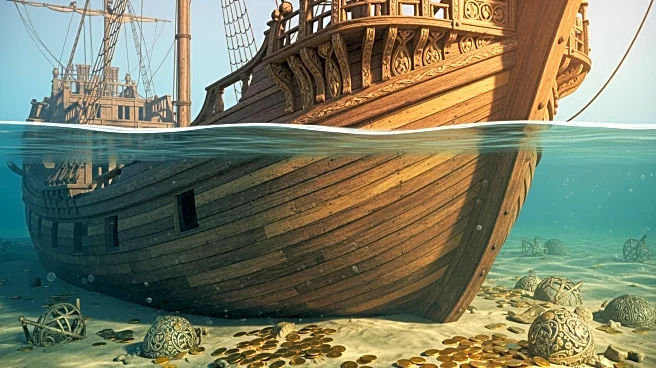What's Happening?
In 1965, British military historian Alexander McKee embarked on a quest to locate the Mary Rose, a Tudor-era warship commissioned by King Henry VIII. The ship, which sank in 1545, was discovered near the Isle
of Wight after McKee's team found a chart from 1841 pinpointing its location. The Mary Rose, constructed in 1510, was a significant vessel in English naval history, predating the Royal Navy. It sank during a battle against the French fleet, taking most of its crew down with it. The ship was found almost intact in 1971, preserved by silt and oxygen-free waters. Divers retrieved numerous artifacts, including weapons, dinner plates with King Henry's initials, and human remains indicating a diverse crew. The Mary Rose Trust, responsible for the ship's preservation, has recovered over 8,300 weapons, earning a Guinness World Record.
Why It's Important?
The recovery of the Mary Rose offers invaluable insights into Tudor-era naval warfare and the cultural composition of its crew. The artifacts challenge previous assumptions about the diversity within the English navy, revealing sailors from various regions, including the Iberian Peninsula and North Africa. The discovery of medieval weaponry provides a unique glimpse into the military technology of the time. The preservation and display of these items at the Mary Rose Museum in Portsmouth contribute to historical education and tourism, enhancing public understanding of England's maritime heritage. The ship's recovery underscores the importance of underwater archaeology in uncovering historical narratives and preserving cultural heritage.
What's Next?
The Mary Rose Museum continues to display the recovered artifacts, offering educational programs and exhibitions to the public. The ongoing preservation efforts by the Mary Rose Trust ensure that the ship and its contents remain accessible for future generations. Researchers may continue to study the artifacts to gain further insights into Tudor-era life and naval practices. The museum's exhibitions may evolve to incorporate new findings and technologies, enhancing visitor engagement and historical understanding.
Beyond the Headlines
The discovery of the Mary Rose highlights the ethical considerations in underwater archaeology, including the respectful treatment of human remains and the preservation of cultural heritage. The ship's recovery has sparked interest in similar archaeological endeavors, encouraging the exploration of other historical shipwrecks. The findings challenge traditional narratives about the racial and cultural composition of historical naval forces, prompting discussions on diversity and inclusion in historical contexts.









